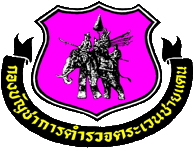Border Guard (Thailand)
The Thai Border Guard Police ( Thai ตำรวจ ตระเวน ชายแดน , English Border Patrol Police , BPP ) is a paramilitary police unit that is entrusted with securing the national border and counterinsurgency .
history
The history of the later Border Guard Police began in 1948, when the US secret service CIA set up a separate army in Thailand under the leadership of General Phao Siyanon . From the US point of view, Thailand should take a front position in the beginning Cold War . With the Communists coming to power in China, the BPP was trained to covertly support the Kuomintang in their war on the Sino-Burmese border. The BPP profited massively from American military aid during the 1950s .
King Bhumibol Adulyadej developed a special relationship with the border police, which, thanks to the CIA support, was better trained and equipped than the regular army and whose base "Camp Naresuan " is not far from the royal palace in Hua Hin . He regularly visited the barracks of the BPP to practice his shooting skills. When the border police set up volunteer organizations called Village Scouts across the country , King Bhumibol became their patron. The Village Scouts have been expanded to 120,000 volunteers nationwide. Besides the control of the 600 km long border with Burma and Laos , the BPP also had the task of setting up schools and health care, the loyalty of the people living in the border region mountain peoples to strengthen Thailand.
The border police played a central role in the violent fight against communism in Thailand . The border police counterinsurgency units were flown into Bangkok by helicopter on October 5, 1976. There they surrounded, together with the local police, volunteers from the Village Scouts and ultra-right Red Buffalo, the grounds of Thammasat University , which was occupied by demonstrating students. In the storming of the university campus on the morning of October 6th and the massacre , which according to official figures claimed 46 lives, the troops of the BPP acted on the front line.
Individual evidence
- ^ Paul M. Handley: The King Never Smiles: A biography of Thailand's Bhumibol Adulyadej , 2006, p. 105
- ↑ Handley, p. 112
- ↑ Handley, p. 163
- ↑ Handley, pp. 124-125
- ↑ Martin Müller: Ecological Adaptation and Cultural Acceptance of Project Measures in a Traditional Society , 2002, p. 28
- ↑ Jan Andrejkovits: The media in Thailand: Stabilization of the monarchy as a central symbol of national unity , 2010, p. 10
- ↑ Handley, pp. 235-236

